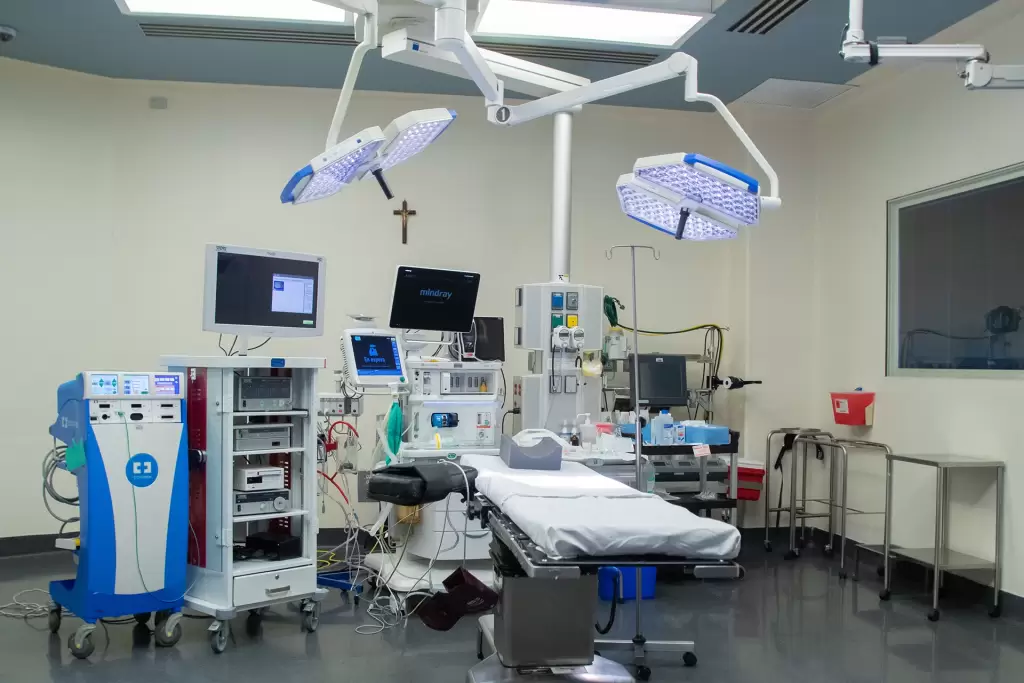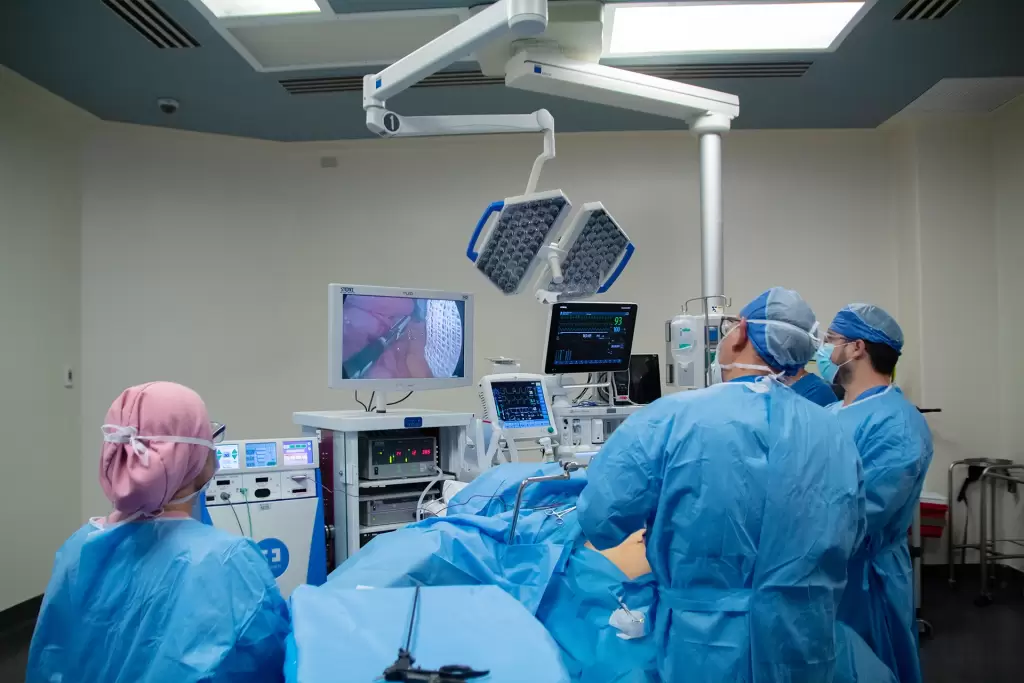Weight-loss surgery in Monterrey, Mexico can start you on the path to a healthier, longer and more fulfilling life. It is not a cure for obesity but rather a tool to help you lose weight. Long-term success depends on your ability to follow guidelines for diet, exercise and lifestyle changes.
Obesity is a disease that can be difficult to treat and is related to many other medical problems. Treatment for obesity goes beyond a quick diet or surgery. Patients should expect to have a new lifestyle that combines healthy eating, exercise, and regular visits to healthcare providers.
Recovery in the hospital
Patients generally spend one to two days in the hospital following minimally invasive bariatric surgery.
In the early days and weeks after surgery, it’s normal to experience fatigue, nausea and vomiting, difficulty sleeping, postsurgical pain, weakness, lightheadedness, loss of appetite, flatulence and gas pain, loose stools, and emotional ups and downs.


Pain Control
You may feel pain at the incision site or as a result of how your body was positioned during surgery. Some patients also experience neck and shoulder pain, which occurs when the body reabsorbs the gas used during surgery.
Pain is addressed with oral medications, which work best when used regularly. Don’t wait for your pain to become intolerable before asking for another dose; maintaining a steady level of the medication in the bloodstream keeps pain manageable.
To reduce the need for opioids, the pain management plan involves multiple treatment modes. In cases where oral opioids are prescribed, it will be only for the first few days after surgery.
Weight loss surgery is an opportunity to improve both the quality and the quantity of life itself.
Dr. Jesus Abraham Vega
Exercises to Speed Recovery
The single most effective way to shorten recovery time is to get active right away. Simply walking short distances and even changing positions in bed promotes circulation. Good blood flow enhances healing and discourages the formation of blood clots.
Perform the following exercises at least once every hour after surgery. It’s also a good idea to practice these movements before surgery to promote lung function and agility.
- Beginning the first night after surgery, sit up and dangle your feet, then stand at your bedside with the help of your nurse or physical therapist. This may hurt but will become easier each time. Your strength will return and your pain will lessen every day.
- The day after surgery, you’ll be asked to get out of bed and walk. After that, walk at least three times per day and perform leg and breathing exercises hourly. You may not feel well enough to go for a walk, but try to do as much as possible.
- Your nurse will teach you how to cough and breathe deeply, and you’ll be shown how to use an incentive spirometer to help expand your lungs. Coughing and deep breathing loosen secretions that may accumulate in your throat or lungs and can help prevent pneumonia. Deep breathing also increases circulation and helps your body eliminate the anesthetics that were used for surgery.
How to breathe deeply:
- Inhale as deeply as you can, letting your belly – not just your chest – expand.
- Hold your breath for two seconds.
- Exhale completely.
- Repeat three times.
How to cough:
- Inhale deeply.
- Cough from your abdomen, not your throat. Hold a pillow against your abdomen for support.
How to exercise your feet and legs:
- While lying on your back in bed, push your toes toward the end of the bed, as if you’re pressing a gas pedal.
- Pull your toes toward the head of your bed, then relax.
- Circle each ankle to the right, then to the left.
- Repeat three times.
Activities to Avoid
For three to six weeks post-op, strenuous activity is not recommended. Avoid lifting anything heavier than 15 to 20 pounds for the first six weeks.
Recommended Activities
During the first few weeks after surgery, you may feel weak and tire easily. However, frequent non strenuous activity, such as short walks, is recommended. Gradually increase the distance of your walks. The more physically active you are, the better for your recovery.
Continue walking at least four times a day, so that you’re walking 30 to 45 minutes per day by the sixth week. If you have specific problems with your weight bearing joints (such as the ankles, knees and hips), you can perform water exercises once your abdominal incisions have healed, typically three to four weeks post-op.
Staying Hydrated
You may be nauseated or experience vomiting the first weeks after surgery. To control these side effects, maintain your fluid intake by taking small, frequent sips of water. Drinking 1.5 to 2 liters of water daily is recommended.
Travel
You can resume traveling short distances as soon as you feel strong enough. Don’t drive a motor vehicle until you’re no longer taking prescription pain medication, which is usually about one week after surgery. If your planned trip involves a long flight, wait at least four weeks after surgery.
Personal Hygiene
During the first several days after discharge, most patients like to have someone at home with them for moral and physical support. You may shower upon returning home.
Wound Care
Your incisions will have sutures (stitches) deep in the skin and surgical glue on top. The sutures dissolve over time, and the glue begins to peel one to two weeks after surgery.
It’s safe to let the incisions get wet during a shower, but don’t submerge them in water until they’re completely healed. As the glue peels off, apply Vaseline or Aquaphor to the incisions to keep the skin moisturized. This prevents scabbing and speeds healing.
A small amount of yellow, pink or clear fluid draining from the incision is normal. If an infection develops at the wound site, it usually occurs three to 10 days after surgery.
Normal Side Effects
You may experience some of the following postsurgical issues, which are considered normal:
- Moderate swelling and bruising. Notify your surgeon if you experience severe swelling and bruising, as these may indicate infection or internal bleeding.
- Mild to moderate discomfort or pain. Notify your surgeon if your pain becomes severe or persists after your pain medication should have taken effect.
- Temporary numbness. This is caused by the cutting of small sensory nerves near the surface of the skin during surgery. Sensation usually returns as the nerve endings heal, typically within six months. Be careful not to burn your skin when using heating pads on areas of the body that may be temporarily numb.
- Shooting electrical sensations within the skin, which often occur as nerve endings heal. This is common during the recovery period, especially with activity. Wearing an abdominal binder can help minimize this symptom.
- Red, dark pink or purple scars in the first weeks to months after surgery. Scars take about a year to fade. It’s important to protect your surgery scars from the sun for a full year, even when covered by a bathing suit, as sunlight can still reach the skin and cause damage. Apply a sunscreen with a sun protection factor (SPF) of at least 30 before any sun exposure.
Bowel Habits
Bowel movements vary greatly after bariatric surgery. Stools may be foul smelling, associated with flatulence, or a different color than normal. Taking iron supplements, for example, will make your stools dark or black.
Until you’re eating more solid food, your stools will be soft. Most of these changes resolve as the body heals and adapts to changes. Please call your bariatric surgery team if you have persistent diarrhea.
After bariatric surgery, you’ll consume much less food and fiber. As a result, you may have bowel movements less frequently and experience constipation. If constipation persists, try adding a powdered fiber supplement to your daily routine.
Sexuality and Pregnancy
You may resume sexual activity when you feel physically and emotionally stable.
It is strongly recommended that sexually active women use a reliable form of birth control, such as IUD, after bariatric surgery, as fertility may increase with rapid weight loss.
It is imperative to avoid pregnancy during the first 12 to 18 months after bariatric surgery. Body weight and micronutrient levels rapidly change during this postoperative period, which is not optimal for supporting a healthy pregnancy.
A Lifelong Commitment
Surgery gives you a physical tool for weight loss, but you must commit to making the mental and emotional changes necessary for long-term weight loss and maintenance.
After surgery, you need to take vitamins and supplements regularly, ingest high-quality nutrients, attend follow-up appointments with your bariatric surgery team, exercise, and participate in support groups. Your emotional and physical well-being depends on your dedication to this multifaceted plan.
Common causes of regaining weight after surgery include lack of exercise, poorly balanced meals, constant grazing, and eating processed carbohydrates and sugars. You must manage your food intake and exercise regularly for the rest of your life.
Monterrey Bariatric Center medical specialists have reviewed this information. It is for educational purposes only and is not intended to replace the advice of Dr. Jesus Abraham Vega or other health care provider.



